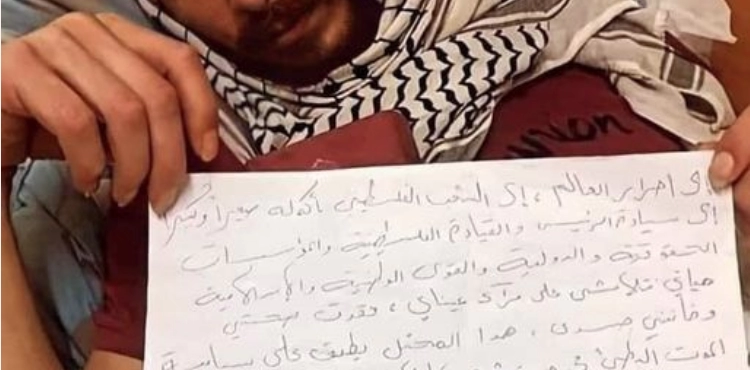The prisoner, Ghazanfar Abu Atwan, entered his 62nd consecutive day of hunger strike, in addition to his administrative detention, amid a continuous deterioration in his health, as he announced yesterday, his refusal to drink water, in a protest move. On the continued intransigence of the occupation in responding to his demand, which is to end his administrative detention.
The Prisoner Club clarified that Ghazanfar has been suffering more and more frequently since yesterday, noting that he refuses to undergo medical examinations.
Yesterday, he sent a message in which he said: “To the free people of the world and to the entire Palestinian people, young and old, to the President, the Palestinian leadership, the human rights and international institutions, and the national and Islamic forces. Kaplan,” so they saved my life, and here I am declaring my water strike on top of my hunger strike, and to God is my whole command.
The Prisoner Club reviewed again the most prominent stations of the 28-year-old prisoner Abu Atwan’s strike. He is a former prisoner. He spent several years in the occupation’s prisons and in 2019 went on a hunger strike, and this is the second strike he is waging in refusal to his administrative detention.
The occupation arrested Abu Atwan in October of last year, and transferred him to administrative detention, and the occupation issued two administrative detention orders against him, each of which lasts (6) months.
He began his open hunger strike on the fifth of last May, when he was languishing in “Raymond” prison. After announcing the strike, he was transferred to the cells, and he was detained in “Raymond” cells for 14 days, during which he was subjected to abuse and assault by the jailers, He was later transferred to the “Ohlikdar” isolation prison, and was held in harsh and difficult conditions in a cell full of insects, until he was forced to refrain from drinking water several times.
On May 31, the occupation military court of appeals in Ofer held a session to consider the appeal submitted by his lawyer to cancel his administrative detention, and later the court rejected the appeal.
The Occupation Prisons Administration transferred him again from Isolation Prison “Ohlikdar” to “Ramleh Clinic” prison after 33 days of his strike, during which the jailers resumed the process of assaulting him. He has suffocated, without any regard for his current health condition.
On the tenth of last June, the Supreme Court of the occupation held a new session for him to consider the petition submitted by his lawyer regarding the cancellation of his administrative detention. The court rejected the petition again.
On June 21, his health condition seriously deteriorated, which necessitated rapid medical intervention by doctors.
After his transfer to the Israeli “Kaplan” Hospital, the occupation prison administration deliberately obstructed lawyers’ visits to him, and threatened him with forced treatment.
On June 23, the lawyer was able to visit him after procrastination and numerous claims, and sent a message to his family, in which he said: “Banazir, my dear sister: What should I write to you and all my sisters and Mahmoud Badl is remiss? Take care of all the families. My dear mother, dear to my heart, I know the most precious thing to you, God, then your mother, may God have mercy on her, then we. Forgive me with all your heart, you and my dear father. Do not be afraid for me that I am the son of Eichmann, Majdoin, my five sisters, my only brother and the bond. I love you all, Ghazanfar your son who misses you.”
On the 24th of last June, the Supreme Court of the occupation issued a decision freezing his administrative detention, which does not mean its abolition, but in fact means releasing the responsibility of the Occupation Prisons and Intelligence (Shin Bet) administration for the fate and life of the prisoner Abu Atwan, and turning him into an “unofficial” prisoner in the hospital. And he remains under the guard of the “security” of the hospital instead of the guards, and he will actually remain a prisoner whose family cannot transport him anywhere, knowing that family members and relatives can visit him as any patient according to the hospital’s laws, as happened many times with former prisoners who went on hunger strikes during past years.
According to medical reports issued about a week ago by the hospital regarding his health condition, the doctors confirmed that the prisoner Abu Atwan faces three serious possibilities, including paralysis, or a chronic health problem that is difficult to treat later, in addition to the possibility of sudden death.
On July 1, the occupation refused to transfer him to a Palestinian hospital despite the court’s decision to suspend his administrative detention, which once again exposes the court’s decision to suspend his administrative detention.
To this day, there are no serious solutions to his case, as the occupation continues its intransigence and refusal to respond to his demand, despite repeated calls for his release.












